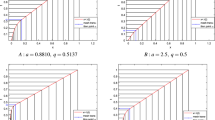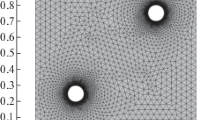Abstract
For very strong convection-dominated problems, stabilized meshless methods such as variational multiscale element-free Galerkin (VMEFG) method may still produce over- and under-shootings near the boundary or interior layers. In this paper, an adaptive VMEFG method is presented to solve convection–diffusion equations with convection-dominated. The adaptive algorithm based on background integration cell locates high gradient region with Zienkiewicz–Zhu indicator and refine the nodes in the region to improve the computational accuracy of VMEFG method. Meanwhile, this adaptive algorithm can also be used in element-free Galerkin (EFG) method. To compare and verify the validity of the proposed adaptive VMEFG method in convection-dominated problem, seven case studies are calculated by the adaptive VMEFG and EFG methods. The numerical experiments show that the proposed adaptive algorithm can not only refine the singularity regions well, but also is simple, effective and efficient for convection-dominated problem.
























Similar content being viewed by others
Data availability
Data sharing is not applicable to this article as no datasets were generated or analysed during the current study.
References
Xu M (2018) A modified finite volume method for convection–diffusion–reaction problems. Int J Heat Mass Transf 117:658–668
Tao WQ, He YL, Li ZY, Qu Z (2004) Some recent advances in finite volume approach and their applications in the study of heat transfer enhancement. In: CHT-04-Advances in Computational Heat Transfer III. Proceedings of the third international symposium, Begel House Inc., pp 1–27
Toro EF (2013) Riemann solvers and numerical methods for fluid dynamics: a practical introduction. Springer, Berlin
Hesthaven JS (2017) Numerical methods for conservation laws: from analysis to algorithms. SIAM, Philadelphia
Donea J, Huerta A (2003) Finite element methods for flow problems. Wiley, New York
Belytschko T, Krongauz Y, Organ D, Fleming M, Krysl P (1996) Meshless methods: an overview and recent developments. Comput Methods Appl Mech Eng 139(1):3–47
Nguyen VP, Rabczuk T, Bordas S, Duflot M (2008) Meshless methods: a review and computer implementation aspects. Math Comput Simul 79(3):763–813
Liu GR, Gu YT (2005) An introduction to meshfree methods and their programming. Springer, Berlin
Garg S, Pant M (2018) Meshfree methods: a comprehensive review of applications. Int J Comput Methods 15(04):1830001
Patel VG, Rachchh NV (2020) Meshless method—review on recent developments. Mater Today Proc 26:1598–1603
Tey WY, Asako Y, Ng KC, Lam WH (2020) A review on development and applications of element-free Galerkin methods in computational fluid dynamics. Int J Comput Methods Eng Sci Mech 21(5):252–275
Wu XH, Dai YJ, Tao WQ (2012) MLPG/SUPG method for convection-dominated problems. Numer Heat Transf Part B Fundam 61(1):36–51
Chen ZJ, Li ZY, Tao WQ (2018) A new stability parameter in streamline upwind meshless Petrov–Galerkin method for convection-diffusion problems at large Peclet number. Numer Heat Transf Part B Fundam 74(5):746–764
Zhang XH, Ouyang J (2006) The element free Galerkin method for steady convection dominated problems. Chin Q Mech 27:220–226
Zhang X, Xiang H (2014) Variational multiscale element free Galerkin method for convection–diffusion–reaction equation with small diffusion. Eng Anal Bound Elem 46:85–92
Liu G, Tu Z (2002) An adaptive procedure based on background cells for meshless methods. Comput Methods Appl Mech Eng 191(17–18):1923–1943
Angulo A, Pozo LP, Perazzo F (2009) A posteriori error estimator and an adaptive technique in meshless finite points method. Eng Anal Bound Elem 33(11):1322–1338
Shanazari K, Rabie N (2009) A three dimensional adaptive nodes technique applied to meshless-type methods. Appl Numer Math 59(6):1187–1197
Shanazari K, Hosami M (2012) Adapting nodes in three dimensional irregular regions for meshless-type methods. Numer Algor 61(1):83–103
Davydov O, Oanh DT (2011) Adaptive meshless centres and RBF stencils for Poisson equation. J Comput Phys 230(2):287–304
Oanh DT, Davydov O, Phu HX (2017) Adaptive RBF-FD method for elliptic problems with point singularities in 2D. Appl Math Comput 313:474–497
Cavoretto R, De Rossi A (2019) Adaptive meshless refinement schemes for RBF-PUM collocation. Appl Math Lett 90:131–138
Cavoretto R, De Rossi A (2020) A two-stage adaptive scheme based on RBF collocation for solving elliptic PDEs. Comput Math Appl 79:3206–3222
Slak J, Kosec G (2019) Adaptive RBF-FD method for Poisson’s equation. WIT Trans Eng Sci 126:149–157
Kaennakham S, Chuathong N (2019) An automatic node-adaptive scheme applied with a RBF-collocation meshless method. Appl Math Comput 348:102–125
Cavoretto R, De Rossi A (2020) Error indicators and refinement strategies for solving Poisson problems through a RBF partition of unity collocation scheme. Appl Math Comput 369:124824
Liu H, Fu M (2013) Adaptive reproducing kernel particle method using gradient indicator for elasto-plastic deformation. Eng Anal Bound Elem 37(2):280–292
Jannesari Z, Tatari M (2020) Magnetohydrodynamics (MHD) simulation via an adaptive element free Galerkin method. Eng Comput 20:1–15
Kaufmann T, Engström C, Fumeaux C (2011) Adaptive meshless methods in electromagnetic modeling: a gradient-based refinement strategy. In: Proceedings of the 41st European microwave conference, IEEE 2011, pp 559–562
Jannesari Z, Tatari M (2020) An adaptive strategy for solving convection dominated diffusion equation. Comput Appl Math 39(2):1–15
Zhang X, Zhang P, Zhang L (2013) An improved meshless method with almost interpolation property for isotropic heat conduction problems. Eng Anal Bound Elem 37(5):850–859
Zhang L, Ouyang J, Zhang X (2013) The variational multiscale element free Galerkin method for MHD flows at high Hartmann numbers. Comput Phys Commun 184(4):1106–1118
Zhang P, Zhang X, Deng J, Song L (2016) A numerical study of natural convection in an inclined square enclosure with an elliptic cylinder using variational multiscale element free Galerkin method. Int J Heat Mass Transf 99:721–737
Bespalov A, Rocchi L, Silvester D (2020) T-IFISS: a toolbox for adaptive FEM computation. Comput Math Appl. https://doi.org/10.1016/j.camwa.2020.03.005
Schmidt A (2018) Adaptive mesh refinement in 2D—an efficient implementation in matlab for triangular and quadrilateral meshes. Ph.D. thesis, Master’s thesis, Universität Ulm
Funken SA, Schmidt A (2019) Ameshref: a matlab-toolbox for adaptive mesh refinement in two dimensions. Numerical geometry, grid generation and scientific computing. Springer, Berlin, pp 269–279
Funken SA, Schmidt A (2020) Adaptive mesh refinement in 2D—an efficient implementation in matlab. Comput Methods Appl Math 20(3):459–479
Elman HC, Silvester DJ, Wathen AJ (2014) Finite elements and fast iterative solvers: with applications in incompressible fluid dynamics. Oxford University Press, Oxford
Acknowledgements
This work is financially supported by the fund of Hubei International Science and Technology Cooperation Base of Fish Passage (no. HIBF2020006).
Author information
Authors and Affiliations
Corresponding author
Ethics declarations
Conflict of interest
The authors declare that they have no conflict of interest.
Ethics approval
The authors approve all the ethics in publishing research works.
Consent for publication
The authors consent for publication of their research.
Additional information
Publisher's Note
Springer Nature remains neutral with regard to jurisdictional claims in published maps and institutional affiliations.
Rights and permissions
About this article
Cite this article
Zhang, X., Zhang, P., Qin, W. et al. An adaptive variational multiscale element free Galerkin method for convection–diffusion equations. Engineering with Computers 38 (Suppl 4), 3373–3390 (2022). https://doi.org/10.1007/s00366-021-01469-6
Received:
Accepted:
Published:
Issue Date:
DOI: https://doi.org/10.1007/s00366-021-01469-6
Keywords
- Meshless methods
- Variational multiscale element-free Galerkin method
- Convection–diffusion equation
- Convection-dominated problem
- Adaptive analysis




